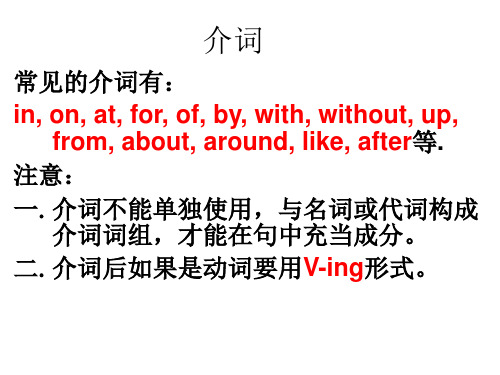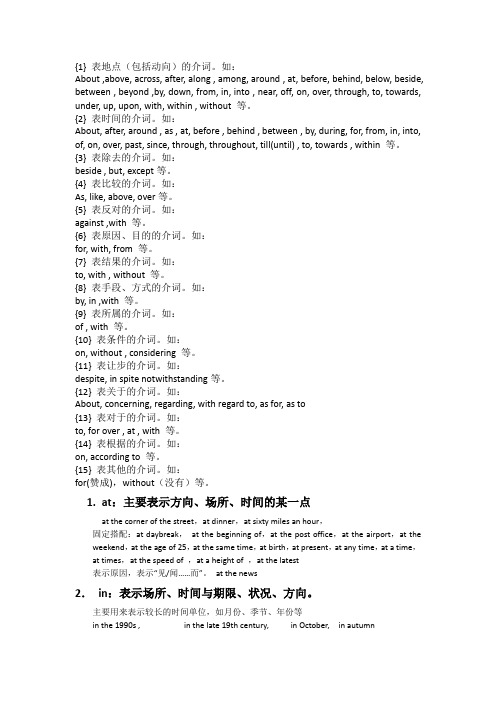与forwith from on about of等介词的用法
介词in-on.at-for.with-by-of的基本用法

介词用法知多少介词是英语中最活跃的词类之一。
同一个汉语词汇在英语中可译成不同的英语介词。
例如汉语中的“用”可译成:(1)用英语(in English);(2)用小刀(with a knife);(3)用手工(by hand);(4)用墨水(in ink)等。
所以,千万不要以为记住介词的一两种意思就掌握了这个介词的用法,其实介词的用法非常广泛,搭配能力很强,越是常用的介词,其含义越多。
下面就简单介绍几组近义介词的用法及其搭配方法。
一. in, to, on和off在方位名词前的区别1. in表示A地在B地范围之内。
如:Taiwan is in the southeast of China.2. to表示A地在B地范围之外,即二者之间有距离间隔。
如:Japan lies to the east of China.3. on表示A地与B地接壤、毗邻。
如:North Korea is on the east of China.4. off表示“离……一些距离或离……不远的海上”。
如:They arrived at a house off the main road.New Zealand lies off the eastern coast of Australia.二. at, in, on, by和through在表示时间上的区别1. at指时间表示:(1)时间的一点、时刻等。
如:They came home at sunrise (at noon, at midnight, at ten o’clock, at daybreak, at dawn).(2)较短暂的一段时间。
可指某个节日或被认为是一年中标志大事的日子。
如:He went home at Christmas (at New Year, at the Spring Festival, at night).2. in指时间表示:(1)在某个较长的时间(如世纪、朝代、年、月、季节以及泛指的上午、下午或傍晚等)。
介词

三. 表示方位的介词 二)over, under, above, below的区别 1. over “在…正上方(垂直)”,也可以指 覆盖,“在…上面”,反义词是under. eg: There is a bridge over the river. 2. under “在…正下方(垂直)” 。 eg:The cat is sleeping under the table. 3. above“在…的下面,低于…”,不一定垂 直,反义词是below。
except, except for
except 同类中“除了。。。之外” except for 非同类中“除了。。。之外” (整体肯定,局部修正) The shop is open everyday except Sunday. He is a handsome guy except for a little fat. Your writing is good except for a few grammar.
七.固定搭配的介词短语 四)动词+形容词+介词 be afraid of, be angry with, be able to, be good at, be good for, be proud of, be famous for, be late for, be full of, be filled with, be interested in, be pleased with, be different from, est.
二)after, in 的区别 1. in +一段时间,表示将来的一段时间之后, 用于将来时。 2. After+一段时间 表示过去的一段时间之后, 用于过去时。 如果after 后跟将来的某一个时刻,也可 以用于将来时。 in eg:He will come back_____a week. after a week. He came back ____ after 5 o’clock. He will come back _____
介词的用法2

一、介词的分类介词可分为三类:1.简单介词:由一个单词构成的介词。
如:about, after, but, for, from, below等。
2.复合介词:由两个或两个以上单词合成的介词,如:into, throughout,onto,within,without, nearby 等。
3.短语介词:一个或两个简单介词和一个或几个其他词类组合成一个短语,相当于一个介词,叫做短语介词,这类介词的末尾总是一个简单介词。
如:according to, because of, out of, in front of, instead of, along with等。
二、介词短语的用法:介词短语作为一个成分在句中可用作定语、状语、表语、宾语补足语等。
1.作定语:介词短语作定语时,一般放在被修饰词的后面,作后置定语。
The book on the desk is very interesting. 书桌上的那本书很有趣。
China is a great country with a long history. 中国是一个具有悠久历史的国家。
2.作状语:介词短语作状语时,一般放在动词后面或句末、句首。
用来表示时间、地点、目的、方式和原因等。
The basketball match will start at nine. 篮球比赛将在9点开始。
(表示时间)He likes to swim in the river. 他喜欢去河里游泳。
(表示地点)I went there to get my book back. 我去那里取回我的书。
(表示目的)I came here by bike. 我骑自行车来到这里。
(表示方式)She was trembling with fear. 她吓得直发抖。
(表示原因)3.作表语:介词短语作表语时,一般放在be动词和连系动词之后。
I'm on duty today. 今天我值日。
高中英语介词用法大全

高中英语介词用法大全介词(虚词),不能在句子中独立充当成分。
它总是用于名词、代词、或相当于名词的其它词类或短语活从句前。
需要掌握的介词有11个:in、on、at、to、from、by、with、for、about、after、before。
时间介词的用法辨析1. 时间介词in、on、at、by的用法辨析A.介词in用来表示一天中*段时间,指天、年、月、季节、周次等。
如:in the morningB.介词on用来表示*一天或星期几,指明具体的时间。
如:on a rainy dayC.介词at用来表示特定的时间、节日、年龄等。
如:at noonD.介词by表示…的时候、到、等到…已经等用在天、时间的前面。
如:by 2 o‘clock2. 时间介词in与after的用法辨析A.介词in + 一段时间用于一般将来时。
如:We’ll go to school in two weeks.B.介词after + 一段时间用于一般过去时。
如:My mother came homeafter half an hour.C.介词after + 时间点常用于一般将来时。
如:We’ll go out for awalk after supper.3. 时间介词for与since的用法辨析A.介词for 表示一段时间如:I have been living here for 10 years.B.介词since 表示从过去*一时间以来如:I have been living here since 2000.4. 时间介词during与for的用法辨析A.当所指的时间起止清楚时用介词during如:He swims every day during the summer.B.如果一段时间不明确则用介词for如:I haven’t seen her for years.5. 时间介词before与by的用法辨析A.介词before表示"在…之前〞如:He won’t come back before five .B.介词by表示"到…时为止,不迟于…〞如:The work must be finished by Friday.6. 时间介词till与until用法的异同和until用在肯定句中,均可表示"直到…为止〞,如:I will waittill(until)seveno'clock.和until用在否认句中,均可表示"在…以前〞或"直到…才〞。
介词的用法

{1} 表地点(包括动向)的介词。
如:About ,above, across, after, along , among, around , at, before, behind, below, beside, between , beyond ,by, down, from, in, into , near, off, on, over, through, to, towards, under, up, upon, with, within , without 等。
{2} 表时间的介词。
如:About, after, around , as , at, before , behind , between , by, during, for, from, in, into, of, on, over, past, since, through, throughout, till(until) , to, towards , within 等。
{3} 表除去的介词。
如:beside , but, except等。
{4} 表比较的介词。
如:As, like, above, over等。
{5} 表反对的介词。
如:against ,with 等。
{6} 表原因、目的的介词。
如:for, with, from 等。
{7} 表结果的介词。
如:to, with , without 等。
{8} 表手段、方式的介词。
如:by, in ,with 等。
{9} 表所属的介词。
如:of , with 等。
{10} 表条件的介词。
如:on, without , considering 等。
{11} 表让步的介词。
如:despite, in spite notwithstanding等。
{12} 表关于的介词。
如:About, concerning, regarding, with regard to, as for, as to{13} 表对于的介词。
介词的用法

介词(preposition):也叫前置词。
在英语里,它的搭配能力最强。
但不能单独做句子成分需和名词或代词(或相当于名词的其他词类、短语及从句)构成介词短语,才能在句中充当成分。
介词的种类:(1)简单介词:about, across, after, against, among, around, at, before, behind, below, beside, but, by, down, during, for, from, in, of, on, over, near, round, since, to, under, up, with等等。
(2)合成介词:inside, into, outside, throughout, upon, without, within(3)短语介词:according to, along with, apart from, because of, in front of, in spite of, instead of, owing to, up to, with regard to(4)分词介词:considering, reguarding, including, concerning某些介词的意义与用法区别1. at, on, in(表时间) : at表示时间的一点;in表示一个时期;on表示特殊日子A. at后常接几点几分,天明,中午,日出,日落,开始等。
如:at five o’clock(五点),at down (黎明),at daybreak (天亮),at sunrise (日出), at noon (中午),at sunset (日落),at midnight (半夜),at the beginning of the month (月初), at that time (那时),at that moment (那会儿),at this time of day (在一天的这个时候)。
from,with,for的用法

from, with, for的用法一、from的用法1. 表示来源from可用来表示事物、地点、人等的来源或者出处,表示“从……来”、“出自”、“起源于”等意义。
例句:The book is from the library.(这本书是从图书馆来的。
)2. 表示原因from还可以用来表示原因,表示“出于”、“从……获得”等意义。
例句:I am suffering from a bad cold.(我患上了严重的感冒。
)3. 表示时间、距离、数量等from还可以表示时间、距离、数量等的起点,表示“从……起”、“从……来”等意义。
例句:The bus runs from 8:00 a.m. to 5:00 p.m.(公交车每天从上午8点运行到下午5点。
)二、with的用法1. 表示伴随with可用来表示动作伴随一个动作或状态进行,表示“与……一起”、“随同”等意义。
例句:She is dancing with her friends.(她和她的朋友一起跳舞。
)2. 表示使用工具、手段with还可以表示使用工具或手段。
例句:I cut the paper with scissors.(我用剪刀剪纸。
)3. 表示具备with还可以表示某人或某事物具备某种特征或品质。
例句:I was impressed with her performance.(她的表现让我印象深刻。
)三、for的用法1. 表示目的for可用来表示目的,表示“为了”、“用于”、“以便”等意义。
例句:She bought some flowers for her mother.(她为她的母亲买了一些花。
)2. 表示时间、距离、数量等for还可以表示时间、距离、数量等,表示“对……而言”的意义。
例句:I have lived in this city for ten years.(我在这座城市住了十年。
)3. 表示代替for还可以表示代替。
介词to for on 等用法

介词to、for、of、in、on、at、with、by、about的用法介词一般都可以接在动词之后,后接作宾语的名词。
也可以直接接宾语。
to可以跟在很多词组后面或者动词后面,表示"到..."或者“于..."例如go to someplace 和settle down to doing sth.for 一般表示“为了”例如It's not good for your health." 还可以表示直接的原因。
of是指“...的”例如:a friend of mine 翻译时有的时候也可以省略如:a cup of tea 还有很多固定词组,如:because of , kind of, handreds of , of course.in的意思是在“在...中,在...里”一般是指在某个空间里,如:I'm in a car.还可以表示穿着什么样的衣服,如:the girl in red 还可以表示“在未来的几天之内”in five days 也可以表示在某日期,如:in the year 2008 . in后常接年,月,日期,上午,下午,晚上,白天,季节,世纪等on 可以表示“在..上”的空间,如:on the desk.on后接某日,星期几,某日或某周日的朝夕,节日等,表示日期,如on Sunday.也可以表示在行进的途中,如:on the way home.另外,说树上长苹果也用on,而树上有小鸟却用in/at 可以表示“在..."如:at home, at school.有时也表示到哪里,如:arrive at .at 后常接几点几分,天明,中午,日出,日落,开始等,如at 5 o'clock.with表示“和,与”的意思,如I go there with my friend.也可以表示“带着”的意思,如:I walk in the park with my dog. He went to school by bike, with his bag in hand.还可以引导伴随状语。
- 1、下载文档前请自行甄别文档内容的完整性,平台不提供额外的编辑、内容补充、找答案等附加服务。
- 2、"仅部分预览"的文档,不可在线预览部分如存在完整性等问题,可反馈申请退款(可完整预览的文档不适用该条件!)。
- 3、如文档侵犯您的权益,请联系客服反馈,我们会尽快为您处理(人工客服工作时间:9:00-18:30)。
• 与with连用的形容词: • angry with sb./at sth.(因某人或某事生气),
• busy h/at(忙于……), • consistent with(与……一致),
• content with(对……满足), • familiar with/to(与……熟悉),
• patient with(有耐心), • popular with(为……所喜爱)
• She wasn’t content with her life.
• 与of连用的形容词:
• afraid of(害怕), • ahead of(在……前面),
guilty of(有……罪的), ignorant of(不了解),
independent of(独立于),
• aware of(知道),
• famous for(以……而闻名), ,
• fit for(合适),
sufficient for(充足的),
• grateful for/to(因……而感激)t,hankful for/to(感谢),
• qualified for/in(能胜任), valid for(有效期为……)
• They were eager for the performance to begin.
与about连用的形容词: • curious about(对……好奇的), • doubtful about/of(对……有疑问),enthusiastic about(
对……热心), • reluctant about/to(勉强), • right about/in(在……是正确的), • uneasy about(对……感到不安)
• She is uneasy about her future.
inferior to(劣于……), liable to(对……有义务的), new to(对……没有经验), obedient to(对……服从), obvious to(对……清楚的),
• fatal to(对……是致命的),
polite to(对……有礼貌),
• harmful to(对……有害的), • identical to(与……相同的), • indifferent to(对……不关心),
shy of(顾虑),
• envious of(妒忌),fond of(爱好),
sure of(肯定), worthy of(值得)
• I was short of money at that time.
• 与to连用的形容词:
• close to(接近于), • contrary to(与……相反), • cruel to(对……残忍), • dear to(对……很重要), • equal to(与……相等), • faithful to(忠于……),
previous to(先于), rude to(对……粗暴无礼), sensitive to(对……敏感),
• Though the bicycle is old, it is very dear tosumismee.iflualrttoo((对与…………有相用似)),
• 与at连用的形容词: • bad at(不善于…), • clever (擅长), • efficient at(能胜任的), • expert at/in(能熟练做…), • good at(善于), • indignant at(对……感到愤慨), • quick at(很快), • sad at/about(因……而悲伤), • slow at(对…迟钝), • skillful at/in(熟练)
• 与from连用的形容词: • away from(距……远的), • different from(与……不同的), • far from(远离), • safe from(无危险的)
• The man was far from comfortable while being confined to the wooden box.
jealous of(妒忌),
• capable of(能够), • careful of/with(小心), • certain of(确信),
kind of/to(对……和蔼), north/south/east/west of(在
……的北/南/东/西面), short of(缺乏),
• conscious of(意识到),
与for,with,of,to,at,from,in,on 和about连用的形容词
• 【Key structures】
ready for/to(准备好),
• 与for连用的形容词:
responsible for(对……负
• eager for(渴望),
责),
• enough for(足够),
sorry for(对……感到遗憾)
• 那人被闷在木箱里时一点儿也不舒服。
• 与in连用的形容词: • deficient in(缺少), • fortunate in(在.很幸运), • weak in(在…薄弱的)
• I was always weak in the science subjects.
• 与on连用的形容词: • dependent on(依赖于……), • intent on(专心于……), • keen on(热心于……)
